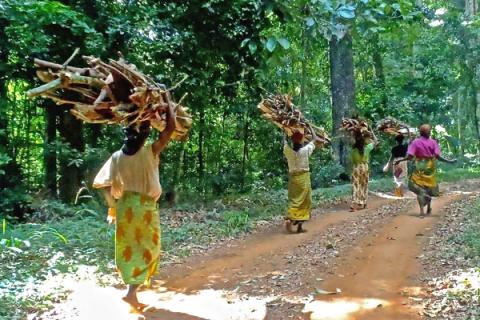Martin Khor (1951-2020), Third World Network's Chairman and former Director, passed away on 1 April 2020 in his home in Penang, Malaysia. Martin was one of the founders of the WRM.
Other information
The September 2019 Forest Cover newsletter from the Global Forest Coalition focuses on the bioenergy developments and use in West Africa and how they are impacting women and forests. From bioenergy produced in large-scale, requiring huge areas of land to provide the raw materials, to the ubiquitous household and community-scale energy needs, where wood is collected mainly by women. Clean cookstove projects are increasingly being tied to commercial tree plantations that produce “clean charcoal”, and eucalyptus trees are being planted on a large-scale purely to burn in a power station.
The People’s Climate Report, from the People’s Climate Network, is designed to offer a perspective on climate change from the bottom up. It aims to understand how communities across the world experience the changing climate. This report offers a glimpse of experiences and voices from communities dealing with a changing climate in West Bengal, Odisha, Jharkhand, and Chhattisgarh, parts of India where waters and forests are increasingly under threat from climate change, deforestation, and lop-sided development.
Social organizations from Uruguay, Finland and other countries, together with well-known professionals, presented the results of scientific research carried out over the past 15 years on the impacts of monoculture tree plantations on grasslands, refuting the "green washing" of UPM company, which presents itself as a leading global corporation in the fight against climate change, the defense of biodiversity and the sustainable water management.
On January 2020, the Dutch National Contact Point for the Organization of Economic Co-operation and Development (OECD) declared a complaint from three Friends of the Earth groups (Milieudefensie -Netherlands, SDI -Liberia and WALHI -Indonesia) against the ING bank, admissible.
This 1992 book, edited by Wolfgang Sachs, compiles more than 15 key concepts that served as a basis for, and a way to expand, destructive discourse about “development.” Each of the concepts analyzed in the book synthesizes a set of assumptions that reinforce the Western world view, wherein certain aspects and subjects of reality are highlighted and others are excluded. This is a necessary reflection that is still current today.
Another reflection around a key concept for forests and forest-dependant people is the WRM’s Bulletin 234, from November 2017, which reflects on the concept of Rights.
A post from the REDD-Monitor blog opens up the space for a needed debate about the politics surrounding so-called nature-based or natural climate “solutions”. Among others, it makes clear which actors are “loving” this initiative: oil and gas corporations in hand with their partners, the big international conservations NGOs who also support carbon offsets and REDD.
ARTE, the European TV channel, broadcasted a documentary about FSC entitled: “The exploitation of primary forests: Can an ecolabel stop the forest industry?” Journalists traveled to several countries to investigate what FSC certification looks like on the ground, and whether it protects the forests and the rights of indigenous peoples and local communities that live in and near the forest. The almost one-hour documentary concludes that over the past 25 years of its existence, FSC has failed even to slow down the logging industry.
A recent report by Friends of the Earth International highlights how classic, stringent regulations are being swapped for much more lenient compensation and offsetting schemes. Specific sectors, such as the global food, agriculture and aviation industries, use these schemes to maintain their social license to continue their destructive activities and ward off the threat of regulation. The report explores and unpacks the myths behind biodiversity offsetting: what it means, and how it enables the destruction of nature and undermines environmental protection.
Chile was to be the host of the UN Climate Summit. But in the face of a massive popular uprising against the neoliberal economic model, Chile cancelled the Summit and it was moved to Spain, yet Chile retained the Presidency of the COP.











